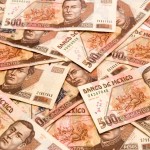On Wednesday gold for delivery in April traded within the range of $1,244.80-$1,260.00. Futures closed at $1,254.30, losing 0.62% on a daily basis. It has been the 12th drop in the past 28 trading days, a third consecutive one and also the sharpest one since February 26th. The daily low has been the lowest level since March 3rd, when a low of $1,238.00 per troy ounce was registered. Gold has trimmed gains to 1.04% so far in March.
On the Comex division of the New York Mercantile Exchange, gold futures for delivery in April were edging down 0.59% on Thursday to trade at $1,246.90 per troy ounce. The precious metal went down as low as $1,245.80 during the early phase of the European trading session, while the current daily high was at $1,255.90 per troy ounce, recorded during early Asian trade.
Today the main focus is set on the European Central Banks meeting on policy, where policy makers are expected to boost monetary easing by another EUR 10 billion to a total of EUR 70 billion a month and to reduce the deposit facility rate by another 10 basis points to -0.4%. In January the ECB Governing Council kept the benchmark interest rate intact at the all-time low of 0.05%. In case expectations were met, this would widen the divergence in policies between the ECB and the Federal Reserve Bank, while the latter may be forced to reassess the pace of its tightening cycle. The FOMC will hold its next meeting on March 15th-16th.
Additionally, the US Department of Labor may report later in the day that the number of people in the country, who filed for unemployment assistance for the first time during the business week ended on March 4th, fell to 275 000 from 278 000, as reported in the preceding week. The latter has been the highest number of claims since the business week ended on January 29th, when 285 000 claims were reported. In case the number of claims met expectations or decreased further, this would have a moderate bullish effect on the US dollar and a moderate bearish effect on gold, respectively.
Earlier on Thursday, the National Bureau of Statistics of China reported that annual consumer prices in the country increased 2.3% in February, outpacing the median forecast by analysts and following a 1.8% surge in January. It has been the highest annual rate of consumer inflation since July 2014, driven mostly by a 7.3% climb in politically sensitive food prices over the Lunar New Year holiday. Consumer goods were 2.6% more expensive in February from a year earlier, while cost of services went up 1.8%. China is the largest producer and the second largest consumer of gold after India on a global scale.
Meanwhile, silver futures for delivery in March were edging down 0.42% on the day to trade at $15.265 per troy ounce, after going down as low as $15.235 a troy ounce during the early phase of the European trading session.
Daily and Weekly Pivot Levels
By employing the traditional calculation method, the daily pivot levels for gold are presented as follows:
Central Pivot Point – $1,253.03
R1 – $1,261.27
R2 – $1,268.23
R3 – $1,276.47
S1 – $1,246.07
S2 – $1,237.83
S3 – $1,230.87
By using the traditional method of calculation again, the weekly pivot levels for gold are presented as follows:
Central Pivot Point – $1,256.13
R1 – $1,293.67
R2 – $1,317.43
R3 – $1,354.97
S1 – $1,232.37
S2 – $1,194.83
S3 – $1,171.07





